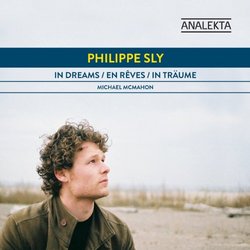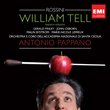| All Artists: Philippe Sly, Michael McMahon, Robert Schumann, Maurice Ravel, Joseph-Guy Ropartz, Jonathan Dove Title: In Dreams Members Wishing: 0 Total Copies: 0 Label: Analekta Release Date: 10/2/2012 Genre: Classical Style: Number of Discs: 1 SwapaCD Credits: 1 UPC: 774204983628 |
Search - Philippe Sly, Michael McMahon, Robert Schumann :: In Dreams
 | Philippe Sly, Michael McMahon, Robert Schumann In Dreams Genre: Classical 'Out of my own great woe/ I make my little songs,/ Which rustle their feathers in throngs,/ And beat on her heart even so.' So wrote Elisabeth Barrett Browning after a poem in Heinrich Heine s collection Lyrisches Intermez... more » |
Larger Image |
CD Details
Synopsis
Product Description
'Out of my own great woe/ I make my little songs,/ Which rustle their feathers in throngs,/ And beat on her heart even so.' So wrote Elisabeth Barrett Browning after a poem in Heinrich Heine s collection Lyrisches Intermezzo. First published in 1823, a discrete echo of his lost loves, it is one of the Heine s most interesting works. It is hardly surprising, then, that Robert Schumann and Joseph-Guy-Marie Ropartz, both raised with a love of literature, would wish to set some of these gems to music.
Schumann has reason to be doubly indebted to Heine, who, like the composer, was torn between a lyrical, almost tender vulnerability and a biting, sometimes scathing irony an extension of his not inconsiderable cynicism. While the Liederkreis, Op. 24, from February 1840 (which set nine of Heine s works), are already convincing, the Dichterliebe (The Poet s Love), completed a few months later, are a high point of the genre. Of the 20 lieder that originally made up the cycle, Schumann kept 16; the songs are surprisingly varied in both inspiration and execution, with textures ranging from translucent to burgeoning and an emotional thrust ranging from exquisite tenderness to blazing ardour. How successful these songs may be in public, I cannot really say. I can say, however, that I have never before written anything with such love as when I was composing this group, wrote Schumann when submitting the manuscript to a Berlin publisher.
In these songs, the piano becomes an extension of Schumann s ego, the second character in an intimate dialogue. He lends an attentive, almost unflappable, ear ( Aus meinen Thränen sprießen ), supports with deference ( Ich will meine Seele tauchen ), deftly illustrates ( Und wüßten s die Blumen ), morphs into a ghost ( Ich hab in Traum geweinet ), or subjugates the matter ( Ich grolle nicht ). The instrumental preludes and interludes free the voice from the musical fabric ( Im wunderschönen Monat Mai ), and the long postludes ( Hör ich das Liedchen klingen and the last one, Die alten, bösen Lieder ) allow it to die away delicately. With the piano so skilfully evoking imagery, the union between poetry and music is completely natural.
In setting and expressing Heine s poems in such a thoughtful manner, Schumann superimposes a dramatic and autobiographical framework over the cycle, a record of his initially thwarted but ultimately requited love for Clara. This transforms the work into an organic whole; so thoroughly has Schumann absorbed the poems that we almost feel as though they no longer belong entirely to Heine.
In the preface to Louis Kornprobst s monograph on Ropartz, Gabriel Le Bras writes that for Ropartz, music was an expression of the soul. A conservatory director, music critic, novelist, founder of the literary magazine L Hermine, and himself a poet (his collections include Adagiettos and Modes mineurs), it was perhaps only natural that he wished to retranslate sections of Lyrisches Intermezzo with Pierre-René Hirsch. These translations, published independently in 1891, were the basis of his song cycle Quatre poèmes d après l Intermezzo d Henri Heine. Any liberty is permissible, notes Ropartz. A musician in command of his craft should be governed by no other laws but his own pleasure, sincerity, and passion.
Maurice Ravel s last completed work, the song cycle Don Quichotte à Dulcinée, set to poems by Paul Morand, was written for Georg Wilhelm Pabst s film Don Quichotte. However, unbeknownst to any of the others, baritone Fédor Chaliapine had commissioned song cycles from a number of different composers (Jacques Ibert s songs were ultimately chosen for the film). For Ravel, these three songs were a chance to pay homage to Cervantès hero and revisit his imaginary Spain.
Schumann has reason to be doubly indebted to Heine, who, like the composer, was torn between a lyrical, almost tender vulnerability and a biting, sometimes scathing irony an extension of his not inconsiderable cynicism. While the Liederkreis, Op. 24, from February 1840 (which set nine of Heine s works), are already convincing, the Dichterliebe (The Poet s Love), completed a few months later, are a high point of the genre. Of the 20 lieder that originally made up the cycle, Schumann kept 16; the songs are surprisingly varied in both inspiration and execution, with textures ranging from translucent to burgeoning and an emotional thrust ranging from exquisite tenderness to blazing ardour. How successful these songs may be in public, I cannot really say. I can say, however, that I have never before written anything with such love as when I was composing this group, wrote Schumann when submitting the manuscript to a Berlin publisher.
In these songs, the piano becomes an extension of Schumann s ego, the second character in an intimate dialogue. He lends an attentive, almost unflappable, ear ( Aus meinen Thränen sprießen ), supports with deference ( Ich will meine Seele tauchen ), deftly illustrates ( Und wüßten s die Blumen ), morphs into a ghost ( Ich hab in Traum geweinet ), or subjugates the matter ( Ich grolle nicht ). The instrumental preludes and interludes free the voice from the musical fabric ( Im wunderschönen Monat Mai ), and the long postludes ( Hör ich das Liedchen klingen and the last one, Die alten, bösen Lieder ) allow it to die away delicately. With the piano so skilfully evoking imagery, the union between poetry and music is completely natural.
In setting and expressing Heine s poems in such a thoughtful manner, Schumann superimposes a dramatic and autobiographical framework over the cycle, a record of his initially thwarted but ultimately requited love for Clara. This transforms the work into an organic whole; so thoroughly has Schumann absorbed the poems that we almost feel as though they no longer belong entirely to Heine.
In the preface to Louis Kornprobst s monograph on Ropartz, Gabriel Le Bras writes that for Ropartz, music was an expression of the soul. A conservatory director, music critic, novelist, founder of the literary magazine L Hermine, and himself a poet (his collections include Adagiettos and Modes mineurs), it was perhaps only natural that he wished to retranslate sections of Lyrisches Intermezzo with Pierre-René Hirsch. These translations, published independently in 1891, were the basis of his song cycle Quatre poèmes d après l Intermezzo d Henri Heine. Any liberty is permissible, notes Ropartz. A musician in command of his craft should be governed by no other laws but his own pleasure, sincerity, and passion.
Maurice Ravel s last completed work, the song cycle Don Quichotte à Dulcinée, set to poems by Paul Morand, was written for Georg Wilhelm Pabst s film Don Quichotte. However, unbeknownst to any of the others, baritone Fédor Chaliapine had commissioned song cycles from a number of different composers (Jacques Ibert s songs were ultimately chosen for the film). For Ravel, these three songs were a chance to pay homage to Cervantès hero and revisit his imaginary Spain.
Similar CDs
| Rossini, Pappano William Tell Genre: Classical Label: EMI Classics | |

